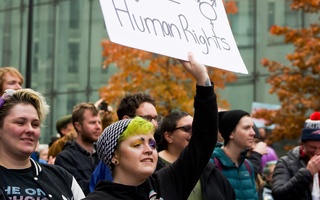Of the over 14,000 words in this year’s readings for Community Conversations, not one was the word “transgender.”
The gay rights movement’s obsessive focus on marriage equality has produced extraordinary progress on that front, but not enough has changed in the experiences of transgender and gender-nonconforming people, said Henri C. Garrison-Desany ’16, Harvard College Queer Advisory Council chair, in an interview.
“I think a lot of trans people are on guard when it comes to disclosing trans status. People just don’t feel comfortable because the world isn’t comfortable with them,” said Garrison-Desany.
Trans teen Leelah Alcorn’s recent suicide is painful evidence of this truth.
Garrison-Desany estimates that transgender and gender-nonconforming students represent two to five percent of the student body, and Alcorn was one of approximately 700,000 trans people in the U.S. at large. Yet, analyzing this year’s Community Conversations readings, one might assume they do not exist at Harvard: the packet made only an oblique, one-sentence reference to gender diversity (a “surgeon could have been a woman first, and then a gay man, or vice-versa”).
The failure of such a platform to offer even cursory coverage of this issue is symptomatic of systematic and institutionalized trans exclusion at Harvard. Last year’s successful gender-neutral housing campaign won mixed-gender blocking groups for sophomores, juniors, and seniors in the House system, but not for first-years. Harvard has an appalling paucity of gender-neutral restrooms. Very few faculty members and TFs ask for students’ preferred gender pronouns. And few students, Garrison-Desany said, are comfortable being out. Sexual assault workshops do not integrate the experiences of trans and gender-nonconforming students.
This exclusion is devastating.
Alcorn’s suicide is one of many: In a survey, 41 percent of transgender respondents said they had attempted suicide. The likelihood that transgender persons will do so increases if they are harassed or bullied in school, if they lose a job because of transphobia, and if they are physically or sexually assaulted.
Education on gender identity reduces stigma and harassment, but Harvard students are not getting this education. Indeed, the Community Conversations reading packet’s description of a “surgeon [who] could have been a woman first, and then a gay man” is ironic confirmation that education is sorely lacking and desperately needed. Directing focus toward the period in which a trans man was perceived as a woman, and endowing it with importance, is reductive and unfair. In fact, many transgender people do not identify with the gender they were assigned at birth, so the trans man referenced in the reading would likely never have identified as a woman.
This is the same misgendering to which Alcorn was subjected, her mother telling her “that [she] would never truly be a girl, that God doesn’t make mistakes, that [Leelah was] wrong.” The dangers of excluding and marginalizing transgender and gender-nonconforming students are real.
In April, representatives of The Diversity Report, a coalition of Harvard students of color, met with Dean of Freshmen Thomas A. Dingman ’67. The students voiced various concerns about institutional support for minority students, and the representation of all genders in Community Conversations was among them.
“We did note that there were a lot of pieces missing on queer issues and trans issues from the packet,” Sasanka N. Jinadasa ’15, a member of The Diversity Report, told me in an interview.
The Freshman Dean’s Office, Jinadasa said, seemed amenable to changes but noted that Harvard must purchase the right to reproduce readings. “It seems like… the FDO might not have wanted to or had the capacity to change the readings in that way.”
Willful apathy is not okay; concerns about the price of readings ring hollow given our nearly $40 billion endowment and the high rate of attempted suicide among transgender Americans.
“The world,” stressed Garrison-Desany, “is not a nice space for trans people.”
Read more in Opinion
The Trouble with Harvard’s Email CultureRecommended Articles
-
DISSENT: A Misplaced PriorityGender-neutral housing is not an altogether bad idea. Though unconventional, it expands student choice in living situations, and if living
-
Office of Student Life Develops Gender-Neutral Housing PolicyFrom choosing blocking groups to navigating the rooming lottery, Harvard housing can be stressful. But the process can cause even more worries for students who feel out of place living with people of the same gender.
-
Continued Discrimination in ROTCThe recent repeal of the U.S. military’s Don’t Ask Don’t Tell (DADT) policy has paved the way for several universities, ...
-
Moving Forward with the MilitaryNow that ROTC is set to become an official presence on campus, the University must take immediate action to ensure that the program and the undergraduates who choose to participate in it can be better incorporated into our community.
-
 Vote Yes on Ballot Question 3
Vote Yes on Ballot Question 3













